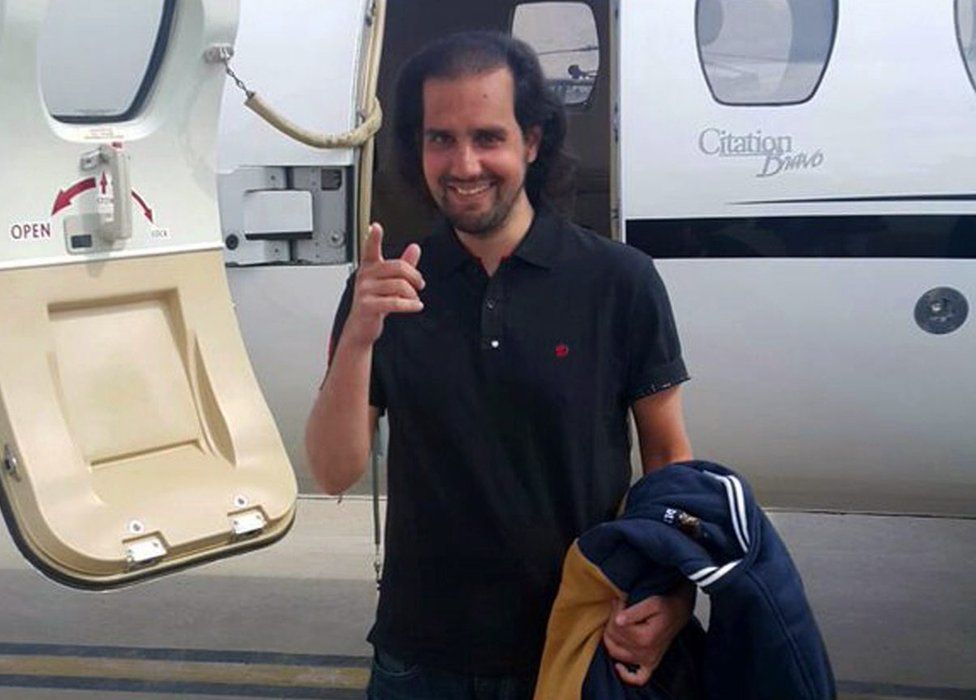Shahbaz Taseer 'deeply touched' by Pakistan support
- Published

The son of a Pakistani politician, recently freed after four years in captivity, tells the BBC he is "deeply touched" by the public's support.
Shahbaz Taseer was seized by gunmen in Lahore in August 2011, months after his father Salman was killed for opposing Pakistan's blasphemy laws.
There was no news from Mr Taseer until last month, when he was released in mysterious circumstances.
Mr Taseer has taken to Twitter to answer questions about his ordeal.
In one of his first comments to the media since his release, he told BBC Urdu's Nosheen Abbas: "A lot of people prayed for my safe return and it's wonderful to now be able to interact with them. I'm deeply touched."
His wife, Maheen, said: "I had been dreaming to meet Shahbaz for so many years...and it just felt so unbelievable. Then all these people joined us in that joy, it was just amazing."
"I felt like we could be ourselves again... I felt alive again. People were rejoicing with us, it felt really good."
'Good to be back'
Mr Taseer was abducted by armed men in 2011, and is believed to have been passed on to a militant group.
Many believe he was being held by some elements of the Pakistani Taliban.
There are few details about his kidnapping and eventual release.
However, the couple have this week begun answering questions on Twitter about their experience, with Mr Taseer's humorous answers sparking delight among many followers.
Shahbaz Taseer's depiction of life as a prisoner - in tweets
- "Haircut once, shave not allowed" during his entire imprisonment
- "No music but I air jammed a lot"
- "My best friend was a spider called Peter"
- Acquired the talent of "stand-up comedy" during captivity
- Learnt "little bit" of Pashto - commonly spoken in Afghanistan, where he was believed to be held
- Best lesson learnt was "patience"
- Asked if he tried to run away, he replied: "Only in my dreams which was good enough"
Mr Taseer's Twitter account flickered back to life three weeks ago, shortly after his release.
Earlier this week, he began responding to curious Pakistanis' questions about his experience with the hashtag #AskST.
Mr Taseer also took time to answer questions on how he survived five years of imprisonment.
Mrs Taseer told the BBC that the couple's question-and-answer session "actually happened really randomly. People started asking us questions two days ago and we decided to answer the questions yesterday."
"It still feels surreal. I hadn't been able to say anything for a long time because I was told not to say this or that... and it felt liberating to be able to talk about it."
'Collective relief' - Nosheen Abbas, BBC News, Islamabad
The sense of collective grief that many in Pakistan had felt when Shahbaz Taseer was abducted turned into a collective sense of relief once he was found alive.
Many people who know the Taseers as public figures felt Shahbaz's disappearance keenly, especially as it happened soon after the murder of his father.
Mrs Taseer says her husband is enjoying Twitter because he hasn't had interaction with people for a long time. Now, they're reaching out to him and it's heartening, she says.
Mr Taseer's reappearance last month, alive and unharmed, came as a surprise for Pakistan.
He had not been heard from since his kidnapping in August 2011, when gunmen seized him from his car while he was on his way to his company's head office in Lahore.
It came after the brutal murder of his father, who was known for his opposition to the country's strict blasphemy laws, by bodyguard Mumtaz Qadri.
The incident shocked the country and divided opinion, with many condemning the killing while Islamists hailed Qadri as a hero.
Qadri was executed in February, prompting large-scale protests from his supporters across the nation.
- Published9 March 2016
- Published8 March 2016
- Published5 January 2011